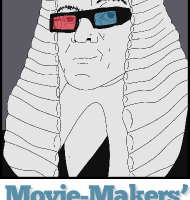 The buildings of Inner Temple haven’t changed on the outside since this movie was made but these days you’d be hard-pressed to find any cigar-smoking, monacle-wearing leading counsel like Sir Wilfred. He’s a mischievous, lovable Old Bailey hack who is about to retire. He takes on a client accused of murdering an elderly lady to get his hands £80,000 from her recently updated will.
The buildings of Inner Temple haven’t changed on the outside since this movie was made but these days you’d be hard-pressed to find any cigar-smoking, monacle-wearing leading counsel like Sir Wilfred. He’s a mischievous, lovable Old Bailey hack who is about to retire. He takes on a client accused of murdering an elderly lady to get his hands £80,000 from her recently updated will.
The clever plot makes use of the fact that a wife cannot be compellable as a witness against her husband. This is supposed to be Sir Wilfred’s last case before he departs for Bermuda but you can that it’s the adrenalin of the courtroom that he lives for. He is the master of deftly timed objections, bold interventions and taking ‘chronic and habitual’ liars to pieces.
This movie has some of the great actors of the time (Laughton, Power, Dietrich) matched by some equally great courtroom dialogue. The funniest of this involves a taylor’s bill for some ‘extremely becoming Bermuda shorts’. (For this we can thank the scriptwriter because it doesn’t appear in the eponymous Agatha Christie play upon which this film is based.)
The Bermuda shorts line raises a dilemma. Is it ethical for counsel to trip up a deceitful witness by allowing them to think that counsel has written proof of their misdeeds when in reality he does not? In Famous Trials of Marshall Hall (1929) Edward Marjoribanks says Marshall Hall once waved a piece of paper in the air and the witness thought it was an incriminating form. Alan Dershowitz, in his Letters to a Young Lawyer (2001), recounts a similar experience and reflects on the rights and wrongs of it. If you find yourself tempted to use this device, take advice on the ethics of it but don’t bank on getting a clear cut answer.
If you have never seen this movie you will be surprised by the plot’s twists and turns. If you have seen it, don’t spoil it for someone who hasn’t. I won’t either.
Penny specialises in witness evidence and never ceases to be fascinated by anything to do with the courtroom. She carries out research into witness issues and teaches judges and barristers about witness handling methods. As often as possible she likes to get a good DVD, a big bag of popcorn and hold a family film festival.
© Penny Cooper, 18 November 2012

